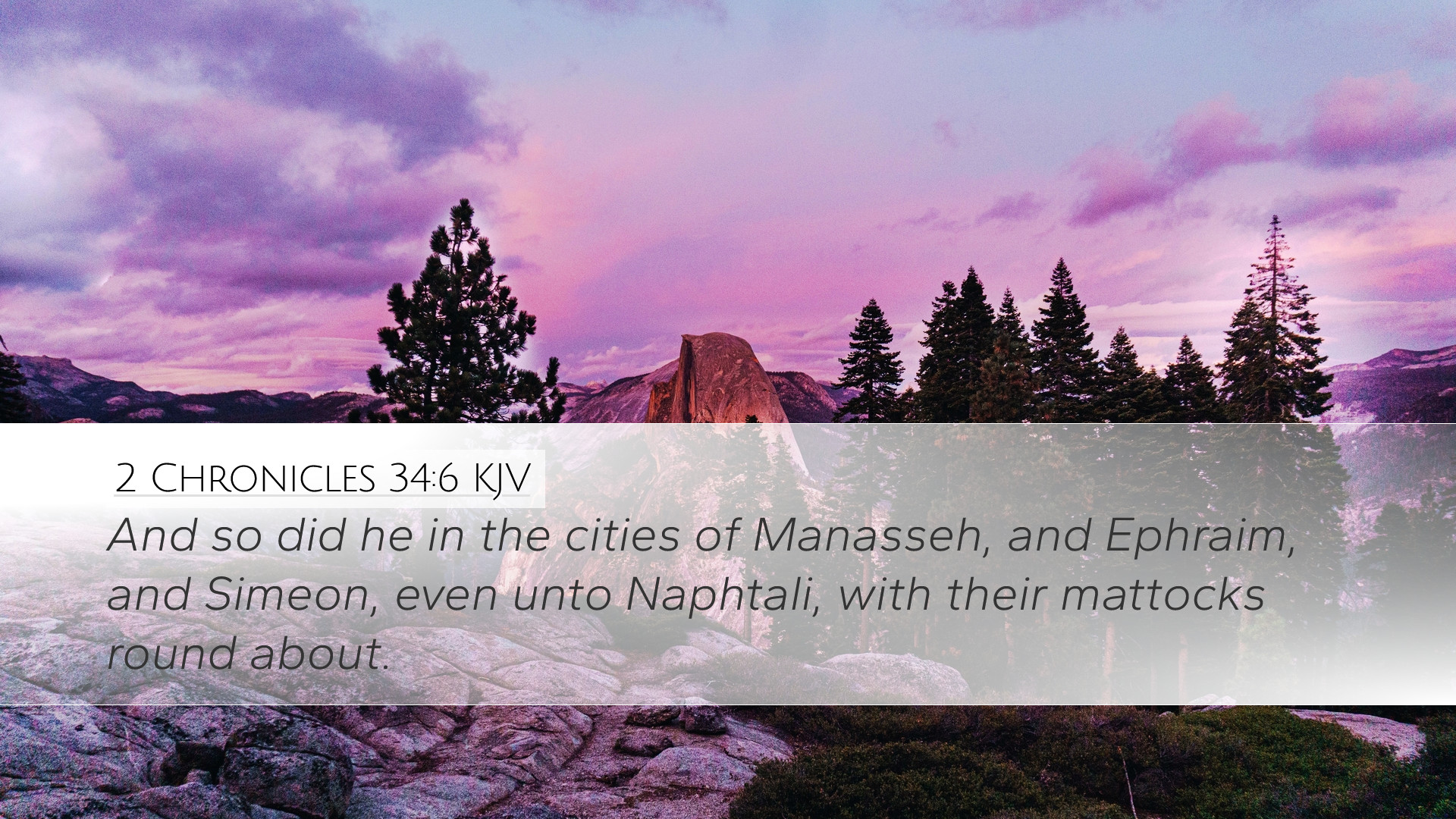Commentary on 2 Chronicles 34:6
Verse Context: "And so did he in the cities of Manasseh, and Ephraim, and Simeon, even unto Naphtali, with their mattocks round about." - 2 Chronicles 34:6
Introduction
The passage in 2 Chronicles 34:6 occurs in the narrative of King Josiah’s reign, which is characterized by a significant religious reform aimed at restoring the worship of Yahweh in Judah. This verse primarily addresses the extent of his reforms beyond the borders of Jerusalem into the territories of the northern tribes.
Insights from Public Domain Commentaries
Historical Context
Matthew Henry's Commentary: Matthew Henry emphasizes the historical backdrop of 2 Chronicles, noting that Israel had long been divided and subject to pagan influences. Josiah, already a righteous king, sought to eradicate idolatry and consolidate true worship across the land, including regions that had once been part of the northern kingdom.
Albert Barnes' Notes: Barnes elaborates on the geographical scope of Josiah’s efforts, highlighting the significance of reaching out to the remnants of Israelite tribes. During his reign, Josiah recognized the importance of unifying the people under the law of God, and this involved a broader mission than merely focusing on Judah.
Spiritual Significance
Adam Clarke's Commentary: Clarke provides insights into the spiritual implications of spreading reform in such a wide geographical area. He notes that it signifies God’s desire for repentance and restoration to extend beyond mere borders, emphasizing that true worship must penetrate the hearts of all people, regardless of their tribal affiliations.
Practical Application
- Cultural Relevance: This passage teaches modern readers about the importance of bringing believers together, fostering unity in diversity as represented by Josiah’s outreach to all tribes.
- Evangelistic Duty: The narrative implies that pastors and churches have a responsibility to engage with communities beyond their immediate surroundings, promoting the message of the Gospel across regional divides.
- Challenge of Influence: Josiah’s reforms highlight the challenge believers face in overcoming negative cultural influences, an issue that persists today as societies are often steeped in various forms of idolatry and secularism.
Leadership Qualities of Josiah
Matthew Henry: He outlines several key leadership traits of Josiah that are evident in this verse:
- Visionary Leadership: Josiah’s vision extended beyond his immediate domain, illustrating the importance of a leader’s broader view in implementing reforms.
- Courage and Zeal: His actions were characterized by a zealous commitment to God's law, which is crucial for any leader aiming to bring about significant change in their community.
- Inclusivity: Josiah’s reform was not limited to Judah; he actively sought to include the northern tribes, showing care for the spiritual well-being of all Israelites.
The Role of Repentance and Restoration
The overarching theme of repentance in Josiah's reforms serves as a call for believers today. The movement from rejecting idolatry to restoring true worship parallels the call of the church to invite people to return to God. This narrative encourages individuals and congregations to reflect on their spiritual state and engage in collective actions towards holistic restoration.
Conclusion
2 Chronicles 34:6 serves not only as a historical account but as a timeless reminder of God’s desire for his people to remain true to Him regardless of geographical or cultural divides. The insights gathered from public domain commentaries collectively highlight the importance of leadership in spiritual reform, the necessity of reaching out to others, and the persistent call for repentance and unity in worship. As modern-day Christians reflect upon this verse, they are invited to hold firm to these principles, encouraging them to engage in active faith that transcends boundaries.


